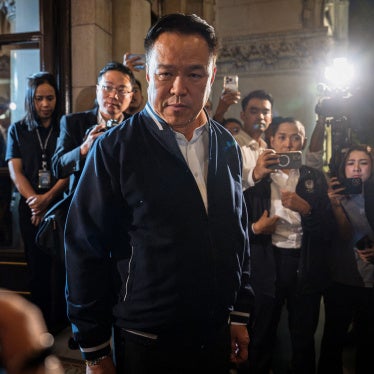(New York) President Clinton should speak out against the detention of a key political figure who goes on trial today in Pakistan, Human Rights Watch said.
On the day President Clinton arrives in Pakistan Dr. Farooq Sattar is set to face hearings for charges under the National Accountability Ordinance. The ordinance, adopted in November after the coup that brought General Pervez Musharraf to power, gives the National Accountability Bureau sweeping powers of arrest, investigation, and prosecution. Dr. Sattar has been in detention for four months and in solitary confinement for over ninety days.
"President Clinton cannot ignore this abusive law that is being used to bring Dr. Sattar to trial," said Mike Jendrzejcyzk, Washington Director of Human Rights Watch's Asia Division. "The military government has used the National Accountability Ordinance to detain scores of political figures, who often have no idea of the charges being brought against them. President Clinton should strongly object to this."
The National Accountability Ordinance was ostensibly adopted to aid in the fight against corruption but Human Rights Watch noted that the broad terms of the law violate international standards and invite selective application against perceived political enemies. Detainees need not be produced in court within 24 hours, as otherwise required by Pakistan's Criminal Procedure Code, and bail is prohibited. The ordinance also allows for expedited trials to be conducted within thirty days. Convicted persons are automatically barred from holding political office for twenty-one years.
Dr. Farooq Sattar is a former parliamentary leader of the Muttahida Qaumi Movement (MQM) in the suspended assembly of Sindh province. The MQM represents mohajirs, Muslims who migrated to Pakistan after the partition from India in 1947.
On November 17, 1999, paramilitary forces and members of the police raided and ransacked Dr. Sattar's home in Karachi. On November 26, after addressing a news conference at the Karachi Press Club, Dr. Sattar surrendered to the authorities and was taken to a military base in Karachi. On February 7 he was produced before the National Accountability Court in Karachi but was not informed of the charges against him. The court remanded him to detention for another fourteen days. On February 23 Dr. Sattar was flown to Islamabad and taken to Attock Fort, ninety-five kilometers away and notorious as a site for the illegal detention of political opponents over the course of successive governments.
The following day, Dr. Sattar was formally charged with corruption-related offenses before the National Accountability Court in Attock Fort. Dr. Sattar's father, who visited his son for an hour that day, told Human Rights Watch, "They have kept [Sattar] in solitary confinement for months. Though they do not torture him physically, they are trying to do everything to psychologically and morally break him." Dr. Sattar is a heart patient with ulcer problems.
Human Rights Watch has called for the amendment of the National Accountability Ordinance so as to vest the powers of arrest and investigation, and of prosecution, in separate bodies. Detainees should be produced in court within twenty-four hours, and once charged, should have adequate time and facilities for the preparation of their defense. The automatic prohibition on holding elected office for twenty-one years upon conviction should be repealed since it violates the political rights of those concerned.
In the absence of such amendments Dr. Sattar and others detained under the ordinance should be tried under Pakistan's existing penal laws and in accordance with the Pakistan Code of Criminal Procedure. Dr. Sattar should also be entitled to a civilian medical examination.
Several prominent office holders in the Sharif administration also continue to be illegally detained by the military government. Human Rights Watch urged that the legal status of these officials be clarified without delay. The authorities now holding them should be required immediately to produce them in court, and should be held to account for any failure to do so, and the detainees should be formally charged or released.







